June 29th, 2014
The symbolism of Kill La Kill
Anime Relations: Kill la Kill, Kill la Kill Specials
The Symbolism of Kill La Kill (SPOILER WARNING: DUH)
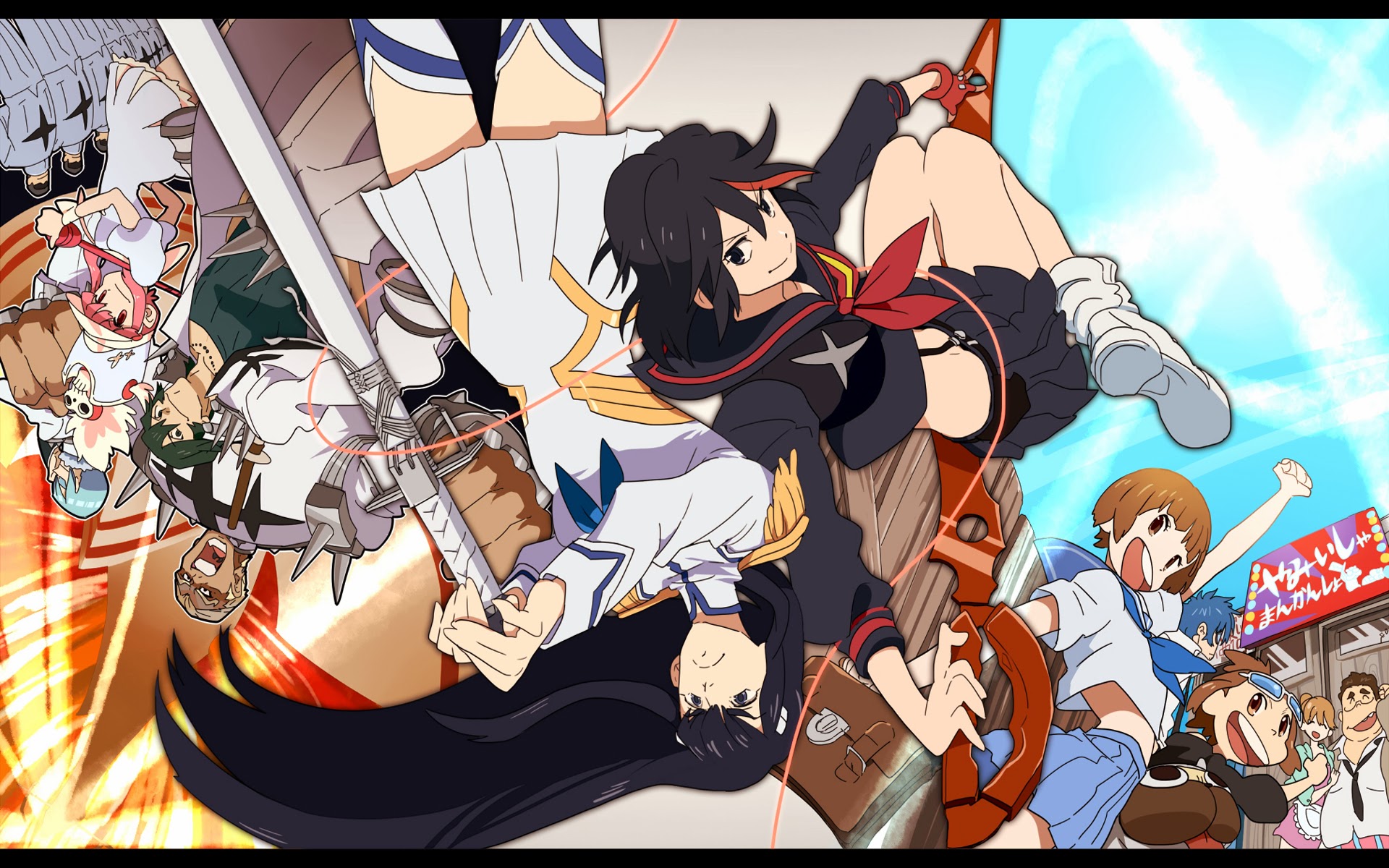
Kill la Kill is underappreciated. That’s right; I said it. One of the most hyped and popular anime of both 2013 and 2014 is UNDERappreciated.
“But Link, what do you mean by that?” some of you may ask. Well, allow me to explain: Too often Kill la Kill is advertised as a mindless, goofy, fanservice romp that prioritizes style over substance and is only good because of how ridiculous it is. Well, I beg to differ; Kill la Kill is not only entertaining, but it is an intellectual social commentary that empowers women, encourages individuality, and shuns both sexism and conformism. How did I arrive at this conclusion from watching a show about girls in insanely skimpy outfits beating the hell out of people? Read on friends, read on.
Now, I already know that a bunch of people are going to accuse me of reading too far into this show and finding false messages in material where meaning does not exist, but the only time you can justifiably accuse someone of “reading too deep” into a series is when he/she makes claims without supporting them with sufficient evidence. Hopefully the readers will find my evidence to be satisfactory, because I certainly do.
So here is what I think Kill La Kill means: First, consider the kamuis themselves; the clothing made of 100% “life fibers” that give Ryuko and Satsuki incredible power. Specifically, kamuis are outfits that are worn by only girls (no boys are ever shown wearing them at any point) and are given to them by their fathers when they come of age (for Satsuki, this was supposed to be on her “wedding day”, a ceremony that for many cultures marks “becoming a woman”). Kamuis give the women wearing them lots of power, but demand a blood sacrifice and blatantly sexualize them. Hmmm, curious isn’t it? It seems to me that the kamuis are supposed to represent the female body. The fact that they are always passed down from father to daughter could be a reference to the fact that it is the father’s DNA that determines the gender of the child and the fact that the kamuis demand blood could be a reference to a woman’s period. The fact that they are given to only girls and only when those girls “come of age” is also a key piece of supporting evidence. Also keep in mind that Senketsu forced himself on Ryuko and didn’t give her a choice regarding whether or not she wanted to wear him, much like you don’t get a say in when puberty hits you. Now, bear with me on these next two connections, because this thought will be long and drawn out: The fact that the kamuis give power to Ryuko and Satsuki is a representation of how individuality empowers women. The reason that the kamuis sexualize Ryuko and Satsuki is an allusion to how the media and society as a whole objectifies women, whereas the other character’s responses to the kamuis represent the judgmental aspect of society and how dressing a certain way will always cause people to draw conclusions about you, gossip about you, and make assumptions about you. The sexual nature of the kamuis also references the advantages and disadvantages that sexuality gives women. Remember how the power of Senketsu decreased the more Ryuko was embarrassed? That doesn’t sound like a pointless plot device to me. When she was able to completely ignore societal norms and be the one rebel who stood up to the system (i.e. be herself), she became stronger and ultimately happier. In fact, this anime is filled with anti-conformity imagery, but we’ll get to that later.
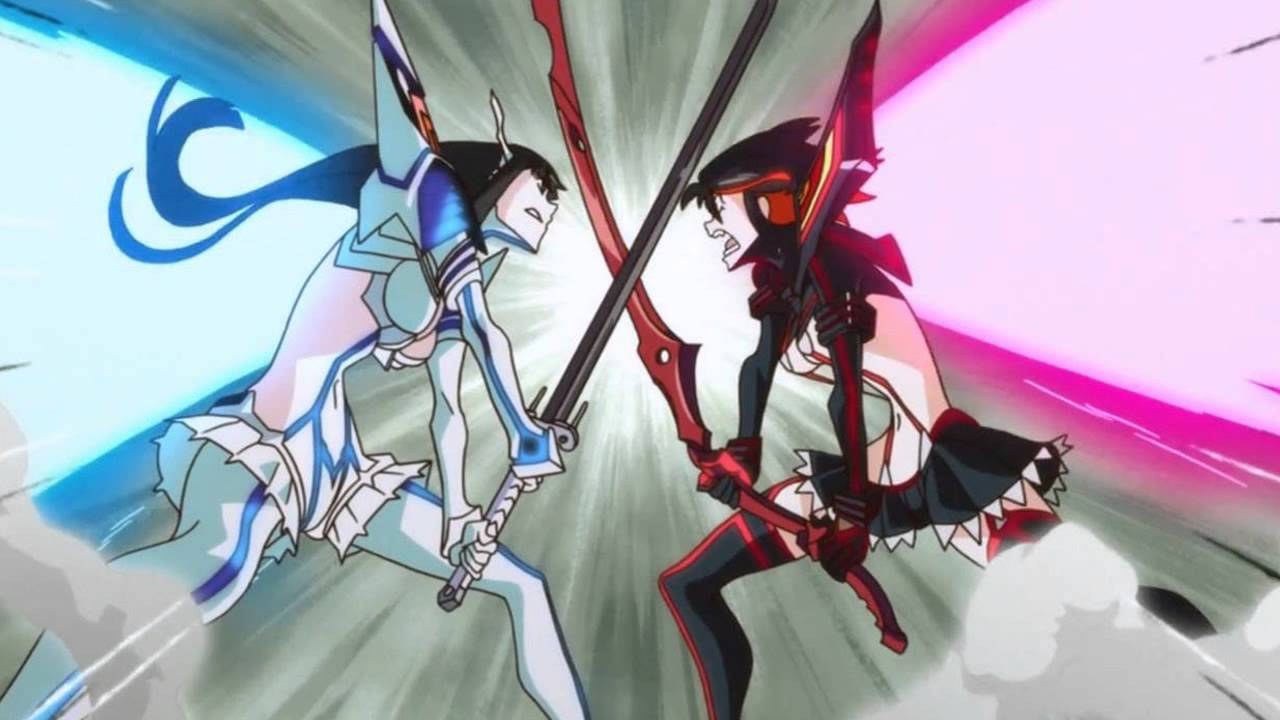
If you aren’t buying this theory, don’t worry, there is plenty more evidence: For example, it is likely that Ryuko’s transformation in episode 12 is supposed to be a representation of PMS. Just look at her:
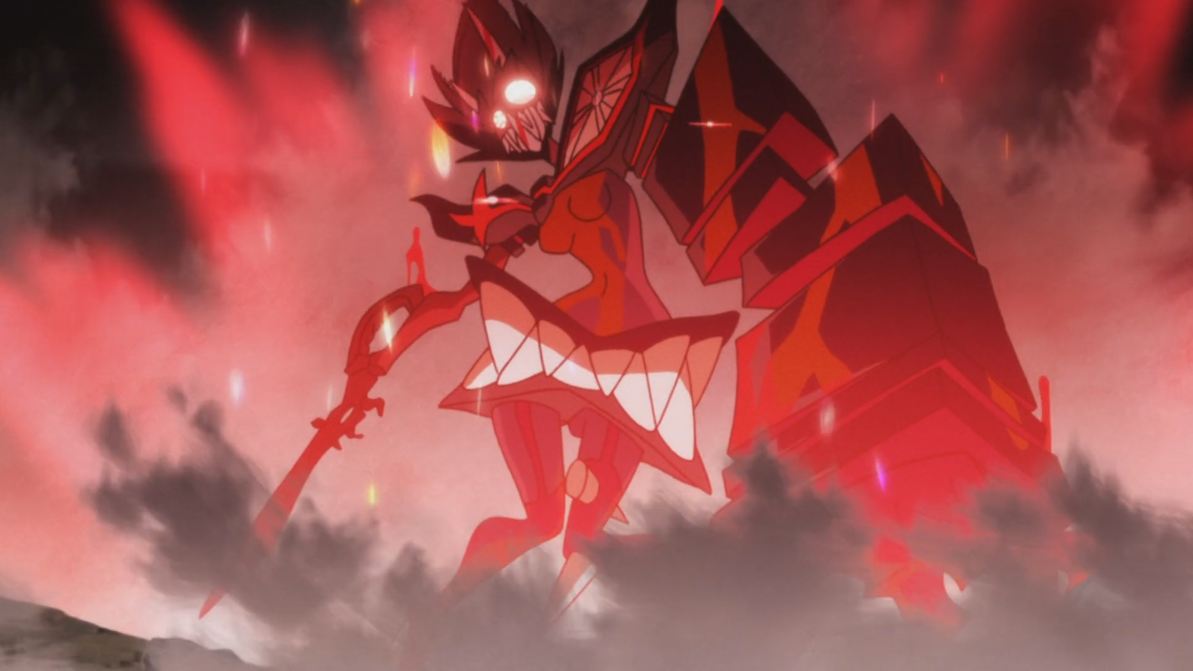
Her stance is clearly unnatural and uncomfortable, almost as if she is trying to hold in… errr… a particular kind of “flow” (lovely image, isn’t it?). She is clearly in pain, looks as if she is cramped, and is bleeding all over the place. I think the comparison is quite clear. The comparison becomes even more believable when you consider what brought on this transformation: Harime Nui. Nui, in my opinion, is a metaphor for pubescent hormones. Her relationship with Ryuko is one of anger, frustration, and futility. She has the innate ability to cause incredible amounts of anger in Ryuko at a moment’s notice and there is nothing Ryuko can do to stop her. She is also the one who killed Ryuko’s father; perhaps a reference to how hormones often trigger an anti-authority complex in teenagers. More convincing though is the episode where Nui transforms into a boy who claims to be in charge of the school newspaper. After meeting this boy, Ryuko begins to listen to and trust him despite her initial disinterest and eventually even brings herself to risk her life for his sake. However, it turns out that she was merely being deceived by “his” seemingly noble cause; Nui revealed her true intentions and left Ryuko beaten and nearly naked, completely stripped of all dignity. This scene draws shocking similarities to a rape; Ryuko’s hormones (Nui) lead her to fall for a guy who only wanted to take advantage of her, causing her to get hurt. Ryuko and Nui even have a conversation later on in which Ryuko shouts “I’m the only one who will ever understand you!” perhaps playing out the mentality that many teenagers have; that nobody understands them. It’s also worth mentioning that Nui is not an entity that can be controlled by anyone; she never does what she is told. Ragyo (more on her later) often attempts to use Nui to her advantage, but in the end she simply does what she wants, much like hormones.
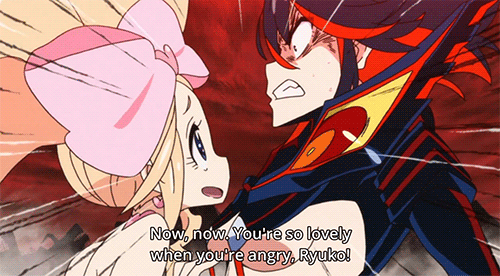
It’s at this point that you may be thinking “So what? You’ve established that Kill La Kill is one big metaphor for puberty in females, but what’s the message behind all of this? What does it all mean?” Well, there are literally a million ways to interpret that, but my interpretation is this: Kill La Kill is encouraging young women to not be influenced by societal norms, the media, or peer pressure while encouraging them to embrace their individuality. To elaborate on that, let’s discuss yet another symbolic character: Ragyo Kiryuin. Ragyo represents the media, specifically how the media manipulates people, causes them to make poor decisions, and objectifies them. She is the embodiment of how corporations feed off of the fears that we have of our own bodies, the fears we have about peer acceptance, and the fears have about ourselves as a whole. She strives to force people to cling to their own sexuality until they become completely consumed by it (literally, thanks to the life fibers). There are several clear hints that this is the case throughout the series, one being the bath scene with Satsuki. It’s important to remember that this scene happens right after Satsuki’s kamui (her body) nearly overcame her own will; it is a moment of weakness and confusion for her. In this scene, we Satsuki being blatantly perverted by Ragyo (the media) and being told what she should do next. This clearly draws parallels to how impressionable young people often look to the media or big business for answers about what is happening to their bodies and what they should do about it despite the fact that the only motivations of those entities are to exploit and objectify them. There is even an episode where we see Ragyo quite literally brainwash the general public and bind them to her will using life fibers; even Ryuko is brainwashed. However, the way that Ryuko breaks out of the brainwashing is key; she uses her hair. This is important when you consider that Ryuko has been repeatedly identified throughout the series by the red streak in her hair, which is a fashion trend that many teens utilize to demonstrate individuality. Mako even uses a hand gesture to represent Ryuko using her red streak multiple times during her “speeches”. Ryuko’s hair represents her individuality and Ragyo represents the media: So Ryuko used her individuality to break free of media influence and corporate control. The hidden meaning behind this scene is quite clear.
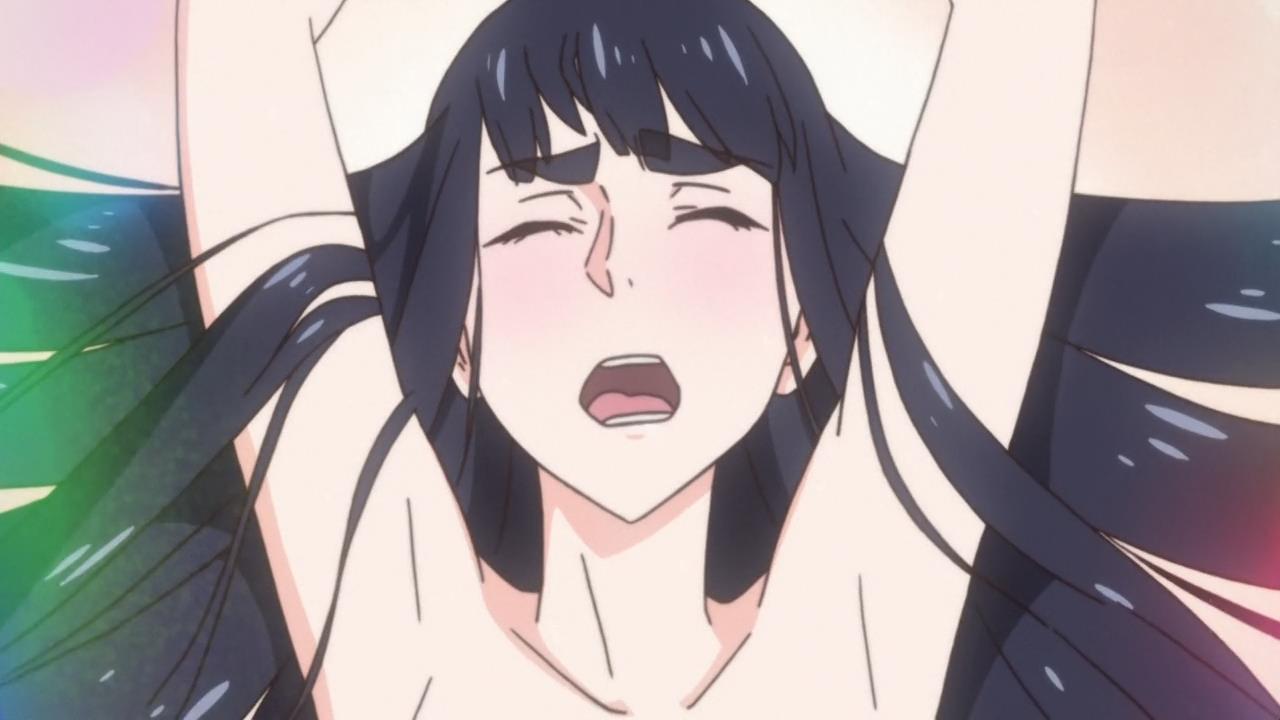
If that’s not enough for you, consider that Kill La Kill is jam packed with anti-conformity and anti-authority imagery. Before I go into that, let it be noted that what specific kind of authority the show is attacking is disputed. Some say that it is attacking the Japanese school system and its over-bearing chain of command while others see the show as a political critique of fascism. If you ask me, I don’t think Kill La Kill was trying to critique any one, specific kind of authority; I believe that it is a statement against all authority as a whole and a message for young people to “Row, row, fight the power!” (To quote another anti-authority work that Kill La Kill’s creators worked on). First, consider the stupid amount of power that Honnouji Academy’s student council has over the students. This is an entity that has the obviously unreasonable ability to kill their students, completely strip them off all free will, and convict them of thought-crime if it even appears that they will rebel against their authority, not to mention their Orwellian slogans (“Fear is Freedom! Subjugation is Liberation!”) This setting is very exaggerated and done in an almost satirical fashion in order to parody the way society stunts individuality; a very clear message if you ask me. Also, consider the way that the one star students and the generic club members are drawn by the animators: They are all made to look EXACTLY the same for a reason. The scene where the tennis club is hitting tennis balls at Mako particularly sticks in my mind: All the club members look exactly the same, their tennis-grunts all sound exactly the same, and their serves are all in perfect synchronization with flawless, machine-like precision. These one star students don’t even feel like human beings; they feel like cogs in a machine. There is nothing that makes them unique or special because they have surrendered to the system and conformed to what the Academy wants them to become; loyal, unquestioning, and well-behaved students who do as they are told. The show purposefully makes being a part of the Academy look as unpleasurable as possible in order to send a message, that message being that conformity takes the purpose out of your life and strips you of individuality.

There are many more symbols I could discuss, such as Nudist Beach, the Rending Scissors, and the names of the kamuis, but hopefully I have at least presented enough evidence to get you thinking about this topic. Regardless of how silly, pandering, and misogynistic Kill La Kill may appear on the outside, there is MUCH more depth and substance to it then people give it credit for. I think it is a masterfully written allegory with an important message behind it all the while maintaining an incredibly engrossing and entertaining storyline at its face value, and that is extremely hard to do. If, after reading this blog entry, you STILL think I’m full of shit and using apophenia, keep in mind that creators of this anime have earned the benefit of the doubt based solely on the merit of their passed works. One of the lead writers, for example, kicked off his career by helping to write a little anime known as Neon Genesis Evangelion, aka the most symbolism-loaded anime of all time. The director of the show also directed the anti-authority Gurren Lagaan and the allegorical FLCL among other things; so the fact that Kill La Kill is likely symbolic shouldn’t be such an unreasonable or unfathomable thought to anybody. I hope those who have stuck around this long got something out of my analysis and I hope I have gotten you think about anime in a more open minded and multi-faceted way; it is a much more intelligent medium then people give it credit for. Have a nice day!
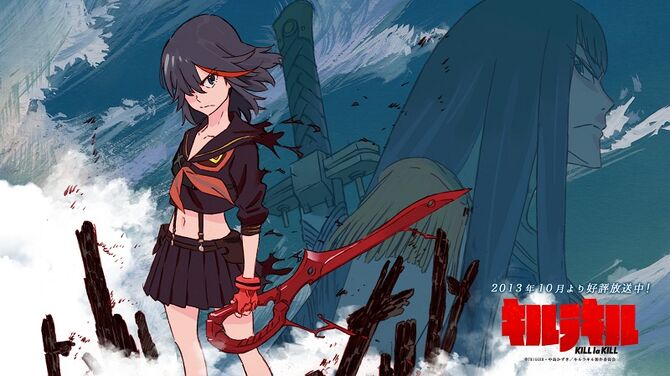

Kill la Kill is underappreciated. That’s right; I said it. One of the most hyped and popular anime of both 2013 and 2014 is UNDERappreciated.
“But Link, what do you mean by that?” some of you may ask. Well, allow me to explain: Too often Kill la Kill is advertised as a mindless, goofy, fanservice romp that prioritizes style over substance and is only good because of how ridiculous it is. Well, I beg to differ; Kill la Kill is not only entertaining, but it is an intellectual social commentary that empowers women, encourages individuality, and shuns both sexism and conformism. How did I arrive at this conclusion from watching a show about girls in insanely skimpy outfits beating the hell out of people? Read on friends, read on.
Now, I already know that a bunch of people are going to accuse me of reading too far into this show and finding false messages in material where meaning does not exist, but the only time you can justifiably accuse someone of “reading too deep” into a series is when he/she makes claims without supporting them with sufficient evidence. Hopefully the readers will find my evidence to be satisfactory, because I certainly do.
So here is what I think Kill La Kill means: First, consider the kamuis themselves; the clothing made of 100% “life fibers” that give Ryuko and Satsuki incredible power. Specifically, kamuis are outfits that are worn by only girls (no boys are ever shown wearing them at any point) and are given to them by their fathers when they come of age (for Satsuki, this was supposed to be on her “wedding day”, a ceremony that for many cultures marks “becoming a woman”). Kamuis give the women wearing them lots of power, but demand a blood sacrifice and blatantly sexualize them. Hmmm, curious isn’t it? It seems to me that the kamuis are supposed to represent the female body. The fact that they are always passed down from father to daughter could be a reference to the fact that it is the father’s DNA that determines the gender of the child and the fact that the kamuis demand blood could be a reference to a woman’s period. The fact that they are given to only girls and only when those girls “come of age” is also a key piece of supporting evidence. Also keep in mind that Senketsu forced himself on Ryuko and didn’t give her a choice regarding whether or not she wanted to wear him, much like you don’t get a say in when puberty hits you. Now, bear with me on these next two connections, because this thought will be long and drawn out: The fact that the kamuis give power to Ryuko and Satsuki is a representation of how individuality empowers women. The reason that the kamuis sexualize Ryuko and Satsuki is an allusion to how the media and society as a whole objectifies women, whereas the other character’s responses to the kamuis represent the judgmental aspect of society and how dressing a certain way will always cause people to draw conclusions about you, gossip about you, and make assumptions about you. The sexual nature of the kamuis also references the advantages and disadvantages that sexuality gives women. Remember how the power of Senketsu decreased the more Ryuko was embarrassed? That doesn’t sound like a pointless plot device to me. When she was able to completely ignore societal norms and be the one rebel who stood up to the system (i.e. be herself), she became stronger and ultimately happier. In fact, this anime is filled with anti-conformity imagery, but we’ll get to that later.

If you aren’t buying this theory, don’t worry, there is plenty more evidence: For example, it is likely that Ryuko’s transformation in episode 12 is supposed to be a representation of PMS. Just look at her:

Her stance is clearly unnatural and uncomfortable, almost as if she is trying to hold in… errr… a particular kind of “flow” (lovely image, isn’t it?). She is clearly in pain, looks as if she is cramped, and is bleeding all over the place. I think the comparison is quite clear. The comparison becomes even more believable when you consider what brought on this transformation: Harime Nui. Nui, in my opinion, is a metaphor for pubescent hormones. Her relationship with Ryuko is one of anger, frustration, and futility. She has the innate ability to cause incredible amounts of anger in Ryuko at a moment’s notice and there is nothing Ryuko can do to stop her. She is also the one who killed Ryuko’s father; perhaps a reference to how hormones often trigger an anti-authority complex in teenagers. More convincing though is the episode where Nui transforms into a boy who claims to be in charge of the school newspaper. After meeting this boy, Ryuko begins to listen to and trust him despite her initial disinterest and eventually even brings herself to risk her life for his sake. However, it turns out that she was merely being deceived by “his” seemingly noble cause; Nui revealed her true intentions and left Ryuko beaten and nearly naked, completely stripped of all dignity. This scene draws shocking similarities to a rape; Ryuko’s hormones (Nui) lead her to fall for a guy who only wanted to take advantage of her, causing her to get hurt. Ryuko and Nui even have a conversation later on in which Ryuko shouts “I’m the only one who will ever understand you!” perhaps playing out the mentality that many teenagers have; that nobody understands them. It’s also worth mentioning that Nui is not an entity that can be controlled by anyone; she never does what she is told. Ragyo (more on her later) often attempts to use Nui to her advantage, but in the end she simply does what she wants, much like hormones.

It’s at this point that you may be thinking “So what? You’ve established that Kill La Kill is one big metaphor for puberty in females, but what’s the message behind all of this? What does it all mean?” Well, there are literally a million ways to interpret that, but my interpretation is this: Kill La Kill is encouraging young women to not be influenced by societal norms, the media, or peer pressure while encouraging them to embrace their individuality. To elaborate on that, let’s discuss yet another symbolic character: Ragyo Kiryuin. Ragyo represents the media, specifically how the media manipulates people, causes them to make poor decisions, and objectifies them. She is the embodiment of how corporations feed off of the fears that we have of our own bodies, the fears we have about peer acceptance, and the fears have about ourselves as a whole. She strives to force people to cling to their own sexuality until they become completely consumed by it (literally, thanks to the life fibers). There are several clear hints that this is the case throughout the series, one being the bath scene with Satsuki. It’s important to remember that this scene happens right after Satsuki’s kamui (her body) nearly overcame her own will; it is a moment of weakness and confusion for her. In this scene, we Satsuki being blatantly perverted by Ragyo (the media) and being told what she should do next. This clearly draws parallels to how impressionable young people often look to the media or big business for answers about what is happening to their bodies and what they should do about it despite the fact that the only motivations of those entities are to exploit and objectify them. There is even an episode where we see Ragyo quite literally brainwash the general public and bind them to her will using life fibers; even Ryuko is brainwashed. However, the way that Ryuko breaks out of the brainwashing is key; she uses her hair. This is important when you consider that Ryuko has been repeatedly identified throughout the series by the red streak in her hair, which is a fashion trend that many teens utilize to demonstrate individuality. Mako even uses a hand gesture to represent Ryuko using her red streak multiple times during her “speeches”. Ryuko’s hair represents her individuality and Ragyo represents the media: So Ryuko used her individuality to break free of media influence and corporate control. The hidden meaning behind this scene is quite clear.

If that’s not enough for you, consider that Kill La Kill is jam packed with anti-conformity and anti-authority imagery. Before I go into that, let it be noted that what specific kind of authority the show is attacking is disputed. Some say that it is attacking the Japanese school system and its over-bearing chain of command while others see the show as a political critique of fascism. If you ask me, I don’t think Kill La Kill was trying to critique any one, specific kind of authority; I believe that it is a statement against all authority as a whole and a message for young people to “Row, row, fight the power!” (To quote another anti-authority work that Kill La Kill’s creators worked on). First, consider the stupid amount of power that Honnouji Academy’s student council has over the students. This is an entity that has the obviously unreasonable ability to kill their students, completely strip them off all free will, and convict them of thought-crime if it even appears that they will rebel against their authority, not to mention their Orwellian slogans (“Fear is Freedom! Subjugation is Liberation!”) This setting is very exaggerated and done in an almost satirical fashion in order to parody the way society stunts individuality; a very clear message if you ask me. Also, consider the way that the one star students and the generic club members are drawn by the animators: They are all made to look EXACTLY the same for a reason. The scene where the tennis club is hitting tennis balls at Mako particularly sticks in my mind: All the club members look exactly the same, their tennis-grunts all sound exactly the same, and their serves are all in perfect synchronization with flawless, machine-like precision. These one star students don’t even feel like human beings; they feel like cogs in a machine. There is nothing that makes them unique or special because they have surrendered to the system and conformed to what the Academy wants them to become; loyal, unquestioning, and well-behaved students who do as they are told. The show purposefully makes being a part of the Academy look as unpleasurable as possible in order to send a message, that message being that conformity takes the purpose out of your life and strips you of individuality.

There are many more symbols I could discuss, such as Nudist Beach, the Rending Scissors, and the names of the kamuis, but hopefully I have at least presented enough evidence to get you thinking about this topic. Regardless of how silly, pandering, and misogynistic Kill La Kill may appear on the outside, there is MUCH more depth and substance to it then people give it credit for. I think it is a masterfully written allegory with an important message behind it all the while maintaining an incredibly engrossing and entertaining storyline at its face value, and that is extremely hard to do. If, after reading this blog entry, you STILL think I’m full of shit and using apophenia, keep in mind that creators of this anime have earned the benefit of the doubt based solely on the merit of their passed works. One of the lead writers, for example, kicked off his career by helping to write a little anime known as Neon Genesis Evangelion, aka the most symbolism-loaded anime of all time. The director of the show also directed the anti-authority Gurren Lagaan and the allegorical FLCL among other things; so the fact that Kill La Kill is likely symbolic shouldn’t be such an unreasonable or unfathomable thought to anybody. I hope those who have stuck around this long got something out of my analysis and I hope I have gotten you think about anime in a more open minded and multi-faceted way; it is a much more intelligent medium then people give it credit for. Have a nice day!

Posted by Link_of_Hyrule | Jun 29, 2014 9:43 AM | 2 comments
March 20th, 2014
Why Shinji Ikari is the most over-hated character in anime
Anime Relations: Shinseiki Evangelion, Shinseiki Evangelion Movie: Shi to Shinsei, Shinseiki Evangelion Movie: Air/Magokoro wo, Kimi ni, Evangelion Movie 1: Jo, Evangelion Movie 2: Ha, Evangelion Movie 3: Q, Shin Evangelion Movie:||
Why Shinji Ikari is the most over-hated character in anime
"I would have liked Eva more if Shinji wasn't such a pussy"
"Why does Shinji have to be such a crybaby all the time?"
"I hate that little bitch Shinji, he ruined Eva for me"
"The characters in Eva suck, Shinji is the worst protagonist I've ever seen"
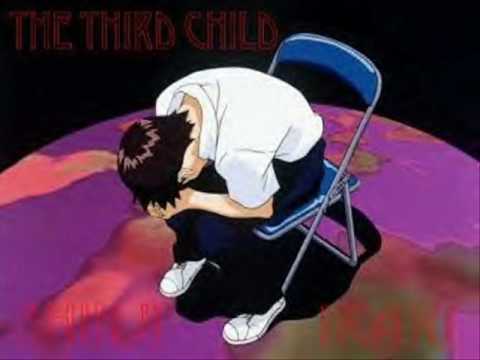
ENOUGH!!! IT. HAS. BEEN. ENOUGH!
If I hear or read one more ignoramus' comment about Shinji Ikari being a horrible character because he is too much of a "wimp" or "crybaby" or "bitch", my head is going to fucking explode. Are there really so many people who missed the point of his character? Why does everyone hate on Shinji so much? Well, actually, I know exactly why, and the reasons are thoroughly pathetic and disappointing:
We now live well into the 21st century; the year 2014. However, as far as fiction/storytelling (including anime) is concerned, it might as well be the stone age. The rigid stereotypes and expectations of what the protagonist of a work of fiction should be, what traits he/she should have, what he/she should look like, and how he/she should act have not changed ONE bit at ANY point throughout history, and that is just depressing.
Don't believe me? Look at one of the earliest works of fiction in recorded history: Beowulf. For anyone who is not familiar with Beowulf, it is the story of a king (named Beowulf) who, for lack of a better term, is a bad-ass mother-fucker. He was the strongest man in the land, he got all the treasure, and slayed all the monsters, etc. Beowulf represented the aspirations of every man during that time period: he was strong, brave, rich, and had no flaws what-so-ever. Keep in mind, this story was written around the 7th century.
Now fast forward to the present; well over a thousand years later. What do protagonists in popular works of fiction look like now? Brace yourselves, because THEY LOOK EXACLY THE SAME! Harry Potter: brave, skilled, well known, unselfish, and no flaws whatsoever. Everybody wants to be Harry Potter. Katniss Everdeen: brave, skilled, well known, unselfish, no flaws whatsoever. Everybody wants to be Katniss Everdeen. In anime? Kirito from Sword Art Online: brave, skilled, well known, unselfish, no flaws whatsoever. Everybody wants to be Kirito.
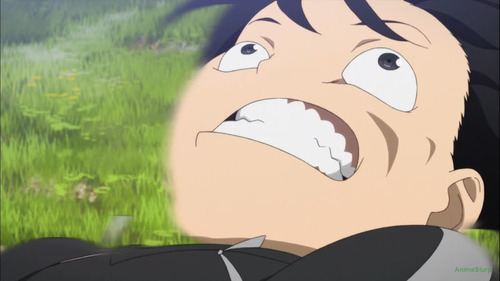
Are you noticing a pattern yet? Almost every single work of fiction to ever become wildly popular, just like Harry Potter, The Hunger Games, and Sword Art Online, all adhere to the exact same cardboard cut-out protagonist who might as well be an angel who fell down from heaven, because they are PERFECT. Why is that? Well, these protagonists have worked for so long because when people read/watch fiction, they often do so to escape reality; to put themselves in someone else's shoes. With that mentality, it makes sense that you might as well put yourself in the shoes of someone who is AWESOME, right? Well, that may be well and good for a few reads/watches, particularly for children who like to let their imaginations run wild, but this concept of a perfect protagonist has become so much more then that: it has become a major, major problem.
How is it a problem? Well, enter Hideki Anno: director of Neon Genesis Evangelion. For those of you not aware of Anno's depression and extremely unstable mental state during the writing and development of Eva, let's just say that it became quite clear very early on that this was not going to be your standard mecha anime. Only once in a generation, if we are lucky, does someone like Anno come along and do something so out-of-the-box that it completely and utterly shatters the perception of the industry and opens doors that had previously been locked and shut.
What did Anno do that was so unique, exactly? Why was Eva so much different from other anime? Well, without going into too much detail for the sake of staying on topic, Eva was a large departure from previous works of animation because it set new precedents regarding what an animated show could convey and how it could convey it. To elaborate, Eva was the first real animated allegory; essentially every character and every thing is symbolic of something much, much greater than it's face value. Eva isn't just a fictional story, it's a beautifully done psychoanalysis that raises thoughtful questions and makes us contemplate things we likely have never considered before. The characters, for example, are symbols for the ways that human beings cope with their insecurities, their pasts, and their self-hatred. Asuka symbolizes using aggression and hostility to hide your true emotions (keep in mind that I am drastically oversimplifying this). Rei symbolizes retreating inward, shutting out society, and living your life for someone else rather than yourself.
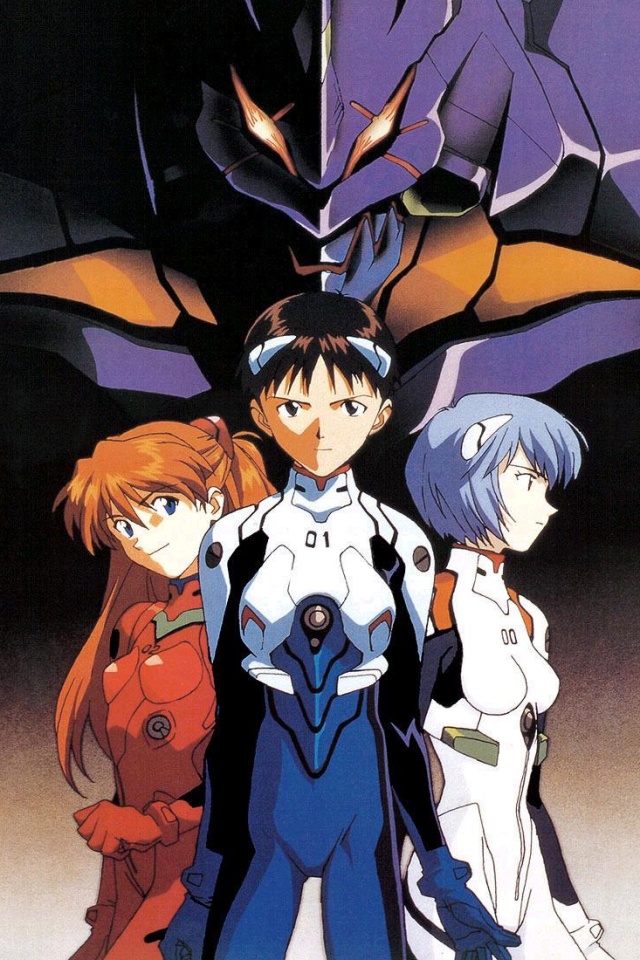
And that brings us to Shinji:
Shinji Ikari represents the way we run away from our problems and choose to hide from reality rather than deal with it; how we shut people out and stop ourselves from forming relationships because of how scared we are of being hurt and vulnerable (Hedgehog's Dilemma). Shinji is a coward because of his deep-seated psychological problems (which are broken down in detail later in the show), and he is perfectly portrayed exactly the way that Anno intended him to be portrayed. We are supposed to look at Shinji and relate his insecurities to our own; to compare him to ourselves. We are NOT supposed to look at Shinji and say "I want to be just like him!" which is what so many mindless fools have succumbed to believing we should do to every protagonist.
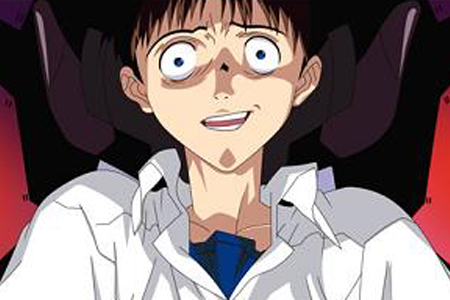
And this brings us back to why mainstream fictional protagonists have done so much damage and been such a major problem for other, better-written works of art; they are brainwashing us. Fooling us. Manipulating us. The Potters and Everdeens and Kiritos of the world have made us all think that the only good protagonist is a badass one. If the character isn't fucking shit up, picking up chicks, and looking cool all while maintaining a perfect personality, they aren't worth your precious time. This mentality of "Would you rather be Kirito or Shinji? Kirito? Then Sword Art Online is better than Eva!" has gotten WAY out of control.
As a result of this, there is a massive number of people who will never get to enjoy masterful works such as Eva for no other reason then because they dismiss the protagonist as "too much of crybaby" without even trying to understand the point of the character or the show! People have lost sight of what truly makes a character "good". It is NOT a contest about how much you want to be that character! Characters should be judged by how well they contribute to the overall plot, themes, and flow of the show, not this bullshit. It just absolutely sickens me to see people describe well written and fleshed out characters as "weak" simply because they themselves are not competent enough to understand what makes a good character, and nobody has been a bigger or more unfortunate victim of this atrocity then Shinji Ikari.
So the next time you hear somebody say that they hate Shinji Ikari or call him a bad character because he's a pussy, do me a favor and tell them to take their ignorant, petty, conventional, narrow-minded, insular, shallow, oblivious ass and go watch Sword Art Online again, because the sheer amount of ignorance floating around the community on this topic is both sad and pathetic.
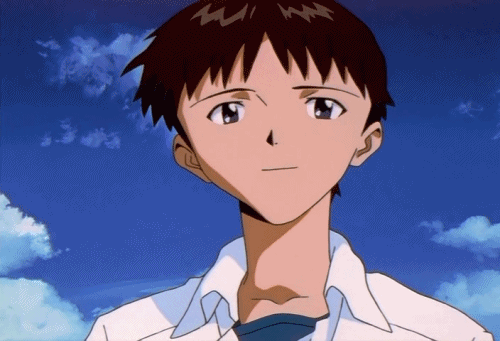
"I would have liked Eva more if Shinji wasn't such a pussy"
"Why does Shinji have to be such a crybaby all the time?"
"I hate that little bitch Shinji, he ruined Eva for me"
"The characters in Eva suck, Shinji is the worst protagonist I've ever seen"

ENOUGH!!! IT. HAS. BEEN. ENOUGH!
If I hear or read one more ignoramus' comment about Shinji Ikari being a horrible character because he is too much of a "wimp" or "crybaby" or "bitch", my head is going to fucking explode. Are there really so many people who missed the point of his character? Why does everyone hate on Shinji so much? Well, actually, I know exactly why, and the reasons are thoroughly pathetic and disappointing:
We now live well into the 21st century; the year 2014. However, as far as fiction/storytelling (including anime) is concerned, it might as well be the stone age. The rigid stereotypes and expectations of what the protagonist of a work of fiction should be, what traits he/she should have, what he/she should look like, and how he/she should act have not changed ONE bit at ANY point throughout history, and that is just depressing.
Don't believe me? Look at one of the earliest works of fiction in recorded history: Beowulf. For anyone who is not familiar with Beowulf, it is the story of a king (named Beowulf) who, for lack of a better term, is a bad-ass mother-fucker. He was the strongest man in the land, he got all the treasure, and slayed all the monsters, etc. Beowulf represented the aspirations of every man during that time period: he was strong, brave, rich, and had no flaws what-so-ever. Keep in mind, this story was written around the 7th century.
Now fast forward to the present; well over a thousand years later. What do protagonists in popular works of fiction look like now? Brace yourselves, because THEY LOOK EXACLY THE SAME! Harry Potter: brave, skilled, well known, unselfish, and no flaws whatsoever. Everybody wants to be Harry Potter. Katniss Everdeen: brave, skilled, well known, unselfish, no flaws whatsoever. Everybody wants to be Katniss Everdeen. In anime? Kirito from Sword Art Online: brave, skilled, well known, unselfish, no flaws whatsoever. Everybody wants to be Kirito.

Are you noticing a pattern yet? Almost every single work of fiction to ever become wildly popular, just like Harry Potter, The Hunger Games, and Sword Art Online, all adhere to the exact same cardboard cut-out protagonist who might as well be an angel who fell down from heaven, because they are PERFECT. Why is that? Well, these protagonists have worked for so long because when people read/watch fiction, they often do so to escape reality; to put themselves in someone else's shoes. With that mentality, it makes sense that you might as well put yourself in the shoes of someone who is AWESOME, right? Well, that may be well and good for a few reads/watches, particularly for children who like to let their imaginations run wild, but this concept of a perfect protagonist has become so much more then that: it has become a major, major problem.
How is it a problem? Well, enter Hideki Anno: director of Neon Genesis Evangelion. For those of you not aware of Anno's depression and extremely unstable mental state during the writing and development of Eva, let's just say that it became quite clear very early on that this was not going to be your standard mecha anime. Only once in a generation, if we are lucky, does someone like Anno come along and do something so out-of-the-box that it completely and utterly shatters the perception of the industry and opens doors that had previously been locked and shut.
What did Anno do that was so unique, exactly? Why was Eva so much different from other anime? Well, without going into too much detail for the sake of staying on topic, Eva was a large departure from previous works of animation because it set new precedents regarding what an animated show could convey and how it could convey it. To elaborate, Eva was the first real animated allegory; essentially every character and every thing is symbolic of something much, much greater than it's face value. Eva isn't just a fictional story, it's a beautifully done psychoanalysis that raises thoughtful questions and makes us contemplate things we likely have never considered before. The characters, for example, are symbols for the ways that human beings cope with their insecurities, their pasts, and their self-hatred. Asuka symbolizes using aggression and hostility to hide your true emotions (keep in mind that I am drastically oversimplifying this). Rei symbolizes retreating inward, shutting out society, and living your life for someone else rather than yourself.

And that brings us to Shinji:
Shinji Ikari represents the way we run away from our problems and choose to hide from reality rather than deal with it; how we shut people out and stop ourselves from forming relationships because of how scared we are of being hurt and vulnerable (Hedgehog's Dilemma). Shinji is a coward because of his deep-seated psychological problems (which are broken down in detail later in the show), and he is perfectly portrayed exactly the way that Anno intended him to be portrayed. We are supposed to look at Shinji and relate his insecurities to our own; to compare him to ourselves. We are NOT supposed to look at Shinji and say "I want to be just like him!" which is what so many mindless fools have succumbed to believing we should do to every protagonist.

And this brings us back to why mainstream fictional protagonists have done so much damage and been such a major problem for other, better-written works of art; they are brainwashing us. Fooling us. Manipulating us. The Potters and Everdeens and Kiritos of the world have made us all think that the only good protagonist is a badass one. If the character isn't fucking shit up, picking up chicks, and looking cool all while maintaining a perfect personality, they aren't worth your precious time. This mentality of "Would you rather be Kirito or Shinji? Kirito? Then Sword Art Online is better than Eva!" has gotten WAY out of control.
As a result of this, there is a massive number of people who will never get to enjoy masterful works such as Eva for no other reason then because they dismiss the protagonist as "too much of crybaby" without even trying to understand the point of the character or the show! People have lost sight of what truly makes a character "good". It is NOT a contest about how much you want to be that character! Characters should be judged by how well they contribute to the overall plot, themes, and flow of the show, not this bullshit. It just absolutely sickens me to see people describe well written and fleshed out characters as "weak" simply because they themselves are not competent enough to understand what makes a good character, and nobody has been a bigger or more unfortunate victim of this atrocity then Shinji Ikari.
So the next time you hear somebody say that they hate Shinji Ikari or call him a bad character because he's a pussy, do me a favor and tell them to take their ignorant, petty, conventional, narrow-minded, insular, shallow, oblivious ass and go watch Sword Art Online again, because the sheer amount of ignorance floating around the community on this topic is both sad and pathetic.

Posted by Link_of_Hyrule | Mar 20, 2014 2:09 PM | 11 comments
February 22nd, 2014
Why I don't like Madoka Magica
Anime Relations: Mahou Shoujo Madoka★Magica, Mahou Shoujo Madoka★Magica Movie 1: Hajimari no Monogatari, Mahou Shoujo Madoka★Magica Movie 2: Eien no Monogatari
[b]This is a review of mine that can't be posted because it contains major spoilers:[/b]
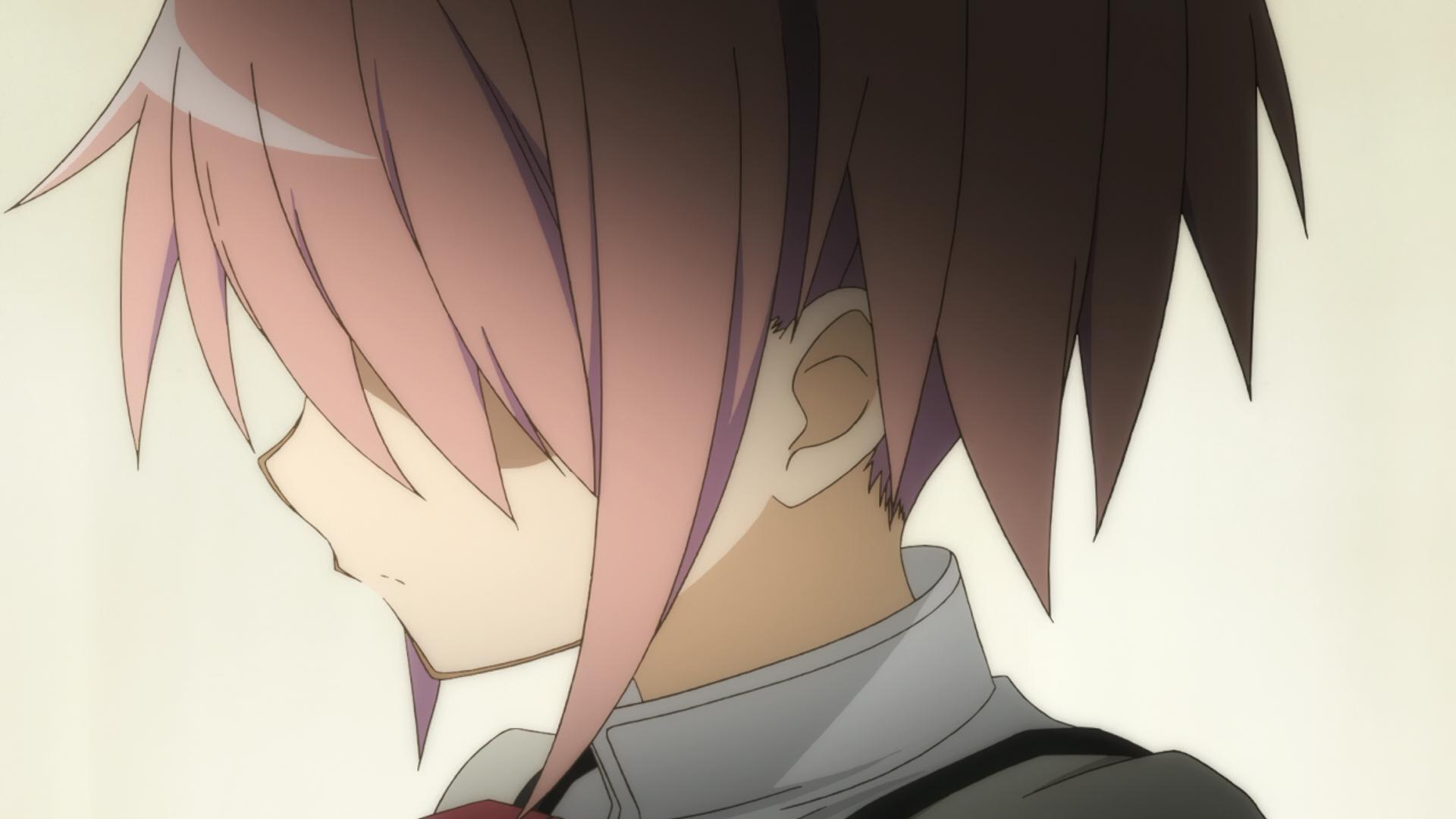
Alright, hear me out Madoka Magica fans. I promise, I'm not just some moron who just doesn't understand what this anime is and what it was trying to be. I knew what to expect going in; I thought I was going to get a deep, thrilling, and thought-provoking deconstruction of the magical girl genre, and I got no such thing. I legitimately hated almost everything about this show. Madoka Magica has been just as overrated, over-hyped, and unjustly romanticized as Sword Art Online in my opinion, more so actually, because at least SAO has a sizable opposition to it. I have seen only 2 or 3 reviews for this show that were not 9s or 10s, so I am offering a viewpoint from the other side, and I am not going to be gentle. I need to level the playing field. If you like this show and you are the kind of person who cannot bare to hear someone bash one of their favorite shows, you might as well stop reading, because I am going to be harsh.
Story: 2/10
The only reason I give the plot a 2 instead of a 1 is because it attempted to break out of the mold; it tried to do something different and stand out, which I respect, but it failed miserably (even though this is DEFINITELY not the first time that the magical girl genre has been deconstructed, so it's really not even that original in the first place).
As previously mentioned, Madoka Magica is supposed to be a deconstruction of the magical girl genre. It attempts to take something that has been done a million times before and show it in a much darker light. It attempts to ask the questions that no other magical girl show has asked before. For example, why is this cute little animal making a deal with a girl so that she gains magical powers? What is this creature's motivation? I love it when shows try to do things like that, and since this show was so highly regarded, I thought I couldn't go wrong. Haha, at least I thought that.
From beginning to end, Madoka Magica's plot is an absolute trainwreck for 3 simple reasons; plotholes, plotholes, and last but not least: plotholes!
I am going to explain the basic premise of the plot, and I want you to tell me if you can spot a plothole within the first two sentences:
An eighth grade girl named Madoka and her best friend Sayaka come across a little creature named Kyuubey, who offers to grant them ANY wish in the entire world and turn them into magical girls, where they will live life fighting off evil, murderous creatures called witches. But then, Madoka discovers that the deal isn't as sweet as it sounds, because if magical girls don't constantly kill witches and take their witch seeds, they will become witches themselves, and there is nothing Madoka can do to stop the vicious cycle.
Spotted the biggest plothole yet? Madoka can wish for ANYTHING she wants to at ANYTIME with NO rules or restrictions and you are telling me that she is not intelligent enough to solve this problem?!
Why didn't she wish what she wished for at the end of the anime immediately after discovering the truth? I saw the "plot twist" that was the ending from 100 miles away. Better yet, why didn't she just wish for infinite wishes? There are LITERALLY hundreds of ways that every single problem that every single character had to face throughout the entire show could have been solved this way, and no matter how much you scream this obvious solution at the screen, the characters won't listen.
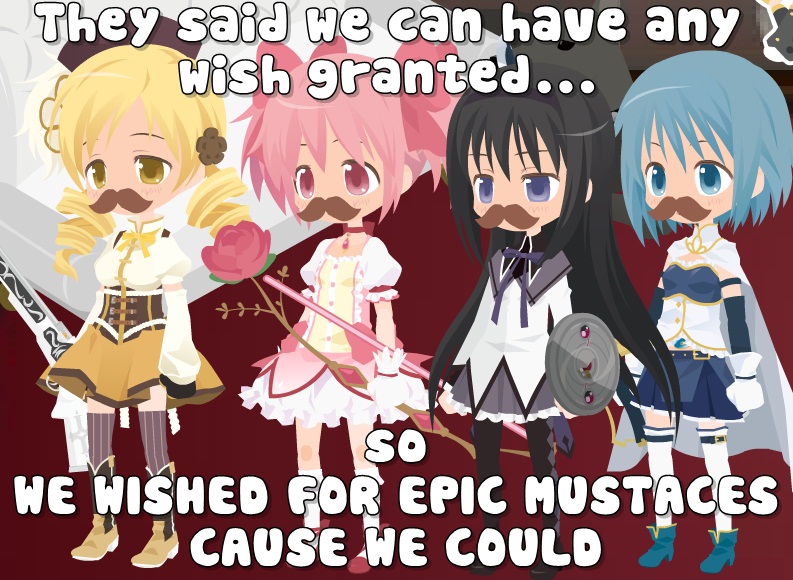
Of course, this is only the headliner to a long list of embarrassing and nonsensical plotholes. Such as:
Why doesn't Homura just tell Madoka what happens if you make the deal? Instead of doing the logical thing, she tries to kill Kyuubey which is impossible and makes Madoka hate her. Why would she think this would work if she already knows that Kyuubey can't die? Oh, wait a minute: she DID try to tell Madoka and Sayaka in a previous world what the deal really meant... AND THEY MADE THE DEAL ANYWAY?!?! I can't get over that! Homura specifically told them exactly what was going to happen and they just said "I don't believe you"? What the hell kind of sense does that make? Homura could have even visibly demonstrated that she was telling the truth by showing them what happens when her soul crystal gets too far away from her! Madoka and Sayaka not only had no reason to distrust Homura, but ignoring her would make them stupid and unreasonably skeptical which would completely go against their characters.
Why doesn't Homura try to stop Walpurgisnacht from forming in the first place? Did it really never cross her mind to save/kill the girl who eventually became it in order to save both Madoka and the world? That's the very first thing that I would do.
What is the purple laser thing that Homura shoots in the beginning of the first episode? Some kind of future gun? Why does she use normal guns later then?
Why didn't Homura use her time freeze ability to prevent Kyubey from running away from her in the first episode?
Does Kyubey have emotions or not? He claims that he doesn't, but his dialogue strongly indicates that he does (i.e. gasping when Madoka made her wish). He even goes as far to give lectures about morality. DUDE. YOU DON'T HAVE EMOTIONS. WHAT DO YOU KNOW ABOUT MORALITY?
Also, how is Kyubey able to travel such absurd distances in such a short amount of time?

The plotholes in this show reach a new level of embarrassingly bad. This plot is a monstrous excuse for writing and that is the most disappointing part about it.
But laughable plotholes aren't the only reason this story is a joke, because now we get to talk about the ending. Oh boy... Well aside from the fact that Madoka could of wished for it at any time, which sucks all the suspense out of it, it also completely undermined the point of the show! This was supposed to be a deconstruction; a depiction of a stereotypical story told in a more realistic universe! So what is the resolution to this deconstruction? Reconstruction. At the end, Madoka just remade the universe into a completely normal magical girl universe, where everything is happy and magical and there are no witches. By completely undermining its own message, Madoka Magica completely loses the right to call itself a deconstruction. Remember: one of the main goals of a deconstruction is to raise thoughtful questions regarding the boundaries and limits of the given universe; Madoka Magica's ending does the exact opposite by establishing that there are none. I can't tell you how many people I've heard claim that Madoka deconstructs the concept of "hope" amazingly well when it so obviously doesn't. Homura has hope the entire time the she can fix the situation and in the end, the situation DOES get fixed! Really nice deconstruction you got there!
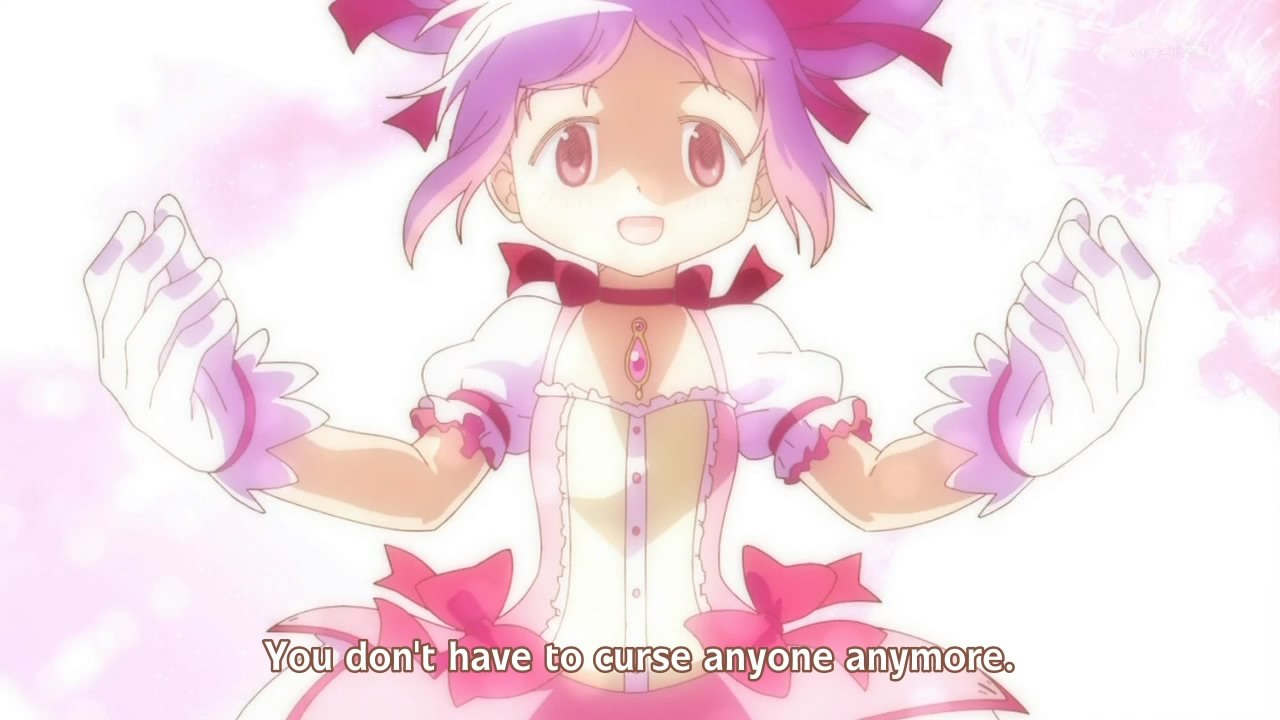
As if that wasn't enough, I guess I'll briefly mention how ridiculously over-reliant this show is on melodrama and the cliche "last second save" technique that makes me feel like I'm watching Bleach. Whether it be Homura, Sayaka, Mami, that red girl whose name I don't remember, or Madoka herself, I don't think a single character goes without getting to jump in from out of nowhere and save the day. For a show that claims to be "mature", it sure takes a whole lot of pages out of the book of battle shounens aimed at preteens. It's predictable, it's corny, and it's not suspenseful. Give me a break already. I could keep going, but hopefully I've at least given you an idea of why I think the plot is a joke.
Art: 4/10
The maze scenes are very stylized and unique, which I liked, but the rest of it is really below average. The animation borders own downright ugly at times, especially during the dialogue scenes. There is very little attention to detail. It was so rushed, that they released a remastered addition shortly after the show finished airing so it actually looked like it was show released after 2005. Taste in animation is subjective, but this was just not my cup of tea.

Sound: 8/10
The sound effects leave a lot to be desired, but the music is very good. I don't think it's quite as good as the fans make it out to be, but it's good none-the-less. The voice acting is actually pretty good for the most part in the subbed version, but the dubbed version is below average.
Characters: 3/10
Boring boring boring boring BORING. Madoka especially is just unbearably uninteresting. There is not a single thing about her that makes her interesting or unique. The only thing worse than having a blatant stereotype for a protagonist is having a protagonist that has no discernible personality at all, and Madoka is the later.
Homura, everyone's favorite character, is not dynamic; she is pseudo-dynamic. All of her development was told through flashback sequences; we never truly got to see any of it. That is not real character development.
Mami make no sense what so ever. I've already been over how she could have just told the girls the truth about being a magical girl (and didn't), but she receives no characterization at all. When she died, she became some sort of icon amongst the fans and everybody loved her for some ungodly reason. She does nothing interesting, is completely indistinguishable, and then dies. Whoop de do. But guys: Death automatically makes the show better right? Doesn't it?
Sayaka, Madoka's best friend, is supposed to be a parody of the pointless side characters in magical girl animes. I'm glad they thought to actually give her a role in the plot, but her character development was very poorly done in my opinion. Her personality transformation was unjustified and simply did not work.
Overall: 3/10
Madoka Magica is proof that a TV show is not good simply because it is different. If there is a more overhyped, over-rated anime in existence besides Sword Art Online, I haven't heard of it. Some people refer to this show as a masterpiece and a brilliant deconstruction, but whatever other people saw in the writing to this show, I did not see. Madoka Magica is only 12 episodes long and I STRUGGLED to get through it. Boring characters, a swiss-cheese plot, a horrible ending, and strange animation are the recipe for a complete disaster.
The writing is simply indefensible in my opinion and therefore I do not recommend this anime to anyone.


Alright, hear me out Madoka Magica fans. I promise, I'm not just some moron who just doesn't understand what this anime is and what it was trying to be. I knew what to expect going in; I thought I was going to get a deep, thrilling, and thought-provoking deconstruction of the magical girl genre, and I got no such thing. I legitimately hated almost everything about this show. Madoka Magica has been just as overrated, over-hyped, and unjustly romanticized as Sword Art Online in my opinion, more so actually, because at least SAO has a sizable opposition to it. I have seen only 2 or 3 reviews for this show that were not 9s or 10s, so I am offering a viewpoint from the other side, and I am not going to be gentle. I need to level the playing field. If you like this show and you are the kind of person who cannot bare to hear someone bash one of their favorite shows, you might as well stop reading, because I am going to be harsh.
Story: 2/10
The only reason I give the plot a 2 instead of a 1 is because it attempted to break out of the mold; it tried to do something different and stand out, which I respect, but it failed miserably (even though this is DEFINITELY not the first time that the magical girl genre has been deconstructed, so it's really not even that original in the first place).
As previously mentioned, Madoka Magica is supposed to be a deconstruction of the magical girl genre. It attempts to take something that has been done a million times before and show it in a much darker light. It attempts to ask the questions that no other magical girl show has asked before. For example, why is this cute little animal making a deal with a girl so that she gains magical powers? What is this creature's motivation? I love it when shows try to do things like that, and since this show was so highly regarded, I thought I couldn't go wrong. Haha, at least I thought that.
From beginning to end, Madoka Magica's plot is an absolute trainwreck for 3 simple reasons; plotholes, plotholes, and last but not least: plotholes!
I am going to explain the basic premise of the plot, and I want you to tell me if you can spot a plothole within the first two sentences:
An eighth grade girl named Madoka and her best friend Sayaka come across a little creature named Kyuubey, who offers to grant them ANY wish in the entire world and turn them into magical girls, where they will live life fighting off evil, murderous creatures called witches. But then, Madoka discovers that the deal isn't as sweet as it sounds, because if magical girls don't constantly kill witches and take their witch seeds, they will become witches themselves, and there is nothing Madoka can do to stop the vicious cycle.
Spotted the biggest plothole yet? Madoka can wish for ANYTHING she wants to at ANYTIME with NO rules or restrictions and you are telling me that she is not intelligent enough to solve this problem?!
Why didn't she wish what she wished for at the end of the anime immediately after discovering the truth? I saw the "plot twist" that was the ending from 100 miles away. Better yet, why didn't she just wish for infinite wishes? There are LITERALLY hundreds of ways that every single problem that every single character had to face throughout the entire show could have been solved this way, and no matter how much you scream this obvious solution at the screen, the characters won't listen.

Of course, this is only the headliner to a long list of embarrassing and nonsensical plotholes. Such as:
Why doesn't Homura just tell Madoka what happens if you make the deal? Instead of doing the logical thing, she tries to kill Kyuubey which is impossible and makes Madoka hate her. Why would she think this would work if she already knows that Kyuubey can't die? Oh, wait a minute: she DID try to tell Madoka and Sayaka in a previous world what the deal really meant... AND THEY MADE THE DEAL ANYWAY?!?! I can't get over that! Homura specifically told them exactly what was going to happen and they just said "I don't believe you"? What the hell kind of sense does that make? Homura could have even visibly demonstrated that she was telling the truth by showing them what happens when her soul crystal gets too far away from her! Madoka and Sayaka not only had no reason to distrust Homura, but ignoring her would make them stupid and unreasonably skeptical which would completely go against their characters.
Why doesn't Homura try to stop Walpurgisnacht from forming in the first place? Did it really never cross her mind to save/kill the girl who eventually became it in order to save both Madoka and the world? That's the very first thing that I would do.
What is the purple laser thing that Homura shoots in the beginning of the first episode? Some kind of future gun? Why does she use normal guns later then?
Why didn't Homura use her time freeze ability to prevent Kyubey from running away from her in the first episode?
Does Kyubey have emotions or not? He claims that he doesn't, but his dialogue strongly indicates that he does (i.e. gasping when Madoka made her wish). He even goes as far to give lectures about morality. DUDE. YOU DON'T HAVE EMOTIONS. WHAT DO YOU KNOW ABOUT MORALITY?
Also, how is Kyubey able to travel such absurd distances in such a short amount of time?

The plotholes in this show reach a new level of embarrassingly bad. This plot is a monstrous excuse for writing and that is the most disappointing part about it.
But laughable plotholes aren't the only reason this story is a joke, because now we get to talk about the ending. Oh boy... Well aside from the fact that Madoka could of wished for it at any time, which sucks all the suspense out of it, it also completely undermined the point of the show! This was supposed to be a deconstruction; a depiction of a stereotypical story told in a more realistic universe! So what is the resolution to this deconstruction? Reconstruction. At the end, Madoka just remade the universe into a completely normal magical girl universe, where everything is happy and magical and there are no witches. By completely undermining its own message, Madoka Magica completely loses the right to call itself a deconstruction. Remember: one of the main goals of a deconstruction is to raise thoughtful questions regarding the boundaries and limits of the given universe; Madoka Magica's ending does the exact opposite by establishing that there are none. I can't tell you how many people I've heard claim that Madoka deconstructs the concept of "hope" amazingly well when it so obviously doesn't. Homura has hope the entire time the she can fix the situation and in the end, the situation DOES get fixed! Really nice deconstruction you got there!

As if that wasn't enough, I guess I'll briefly mention how ridiculously over-reliant this show is on melodrama and the cliche "last second save" technique that makes me feel like I'm watching Bleach. Whether it be Homura, Sayaka, Mami, that red girl whose name I don't remember, or Madoka herself, I don't think a single character goes without getting to jump in from out of nowhere and save the day. For a show that claims to be "mature", it sure takes a whole lot of pages out of the book of battle shounens aimed at preteens. It's predictable, it's corny, and it's not suspenseful. Give me a break already. I could keep going, but hopefully I've at least given you an idea of why I think the plot is a joke.
Art: 4/10
The maze scenes are very stylized and unique, which I liked, but the rest of it is really below average. The animation borders own downright ugly at times, especially during the dialogue scenes. There is very little attention to detail. It was so rushed, that they released a remastered addition shortly after the show finished airing so it actually looked like it was show released after 2005. Taste in animation is subjective, but this was just not my cup of tea.

Sound: 8/10
The sound effects leave a lot to be desired, but the music is very good. I don't think it's quite as good as the fans make it out to be, but it's good none-the-less. The voice acting is actually pretty good for the most part in the subbed version, but the dubbed version is below average.
Characters: 3/10
Boring boring boring boring BORING. Madoka especially is just unbearably uninteresting. There is not a single thing about her that makes her interesting or unique. The only thing worse than having a blatant stereotype for a protagonist is having a protagonist that has no discernible personality at all, and Madoka is the later.
Homura, everyone's favorite character, is not dynamic; she is pseudo-dynamic. All of her development was told through flashback sequences; we never truly got to see any of it. That is not real character development.
Mami make no sense what so ever. I've already been over how she could have just told the girls the truth about being a magical girl (and didn't), but she receives no characterization at all. When she died, she became some sort of icon amongst the fans and everybody loved her for some ungodly reason. She does nothing interesting, is completely indistinguishable, and then dies. Whoop de do. But guys: Death automatically makes the show better right? Doesn't it?
Sayaka, Madoka's best friend, is supposed to be a parody of the pointless side characters in magical girl animes. I'm glad they thought to actually give her a role in the plot, but her character development was very poorly done in my opinion. Her personality transformation was unjustified and simply did not work.
Overall: 3/10
Madoka Magica is proof that a TV show is not good simply because it is different. If there is a more overhyped, over-rated anime in existence besides Sword Art Online, I haven't heard of it. Some people refer to this show as a masterpiece and a brilliant deconstruction, but whatever other people saw in the writing to this show, I did not see. Madoka Magica is only 12 episodes long and I STRUGGLED to get through it. Boring characters, a swiss-cheese plot, a horrible ending, and strange animation are the recipe for a complete disaster.
The writing is simply indefensible in my opinion and therefore I do not recommend this anime to anyone.

Posted by Link_of_Hyrule | Feb 22, 2014 1:26 PM | 11 comments